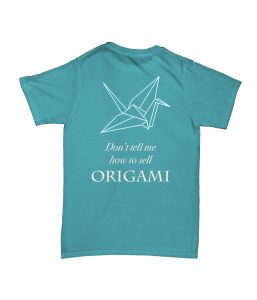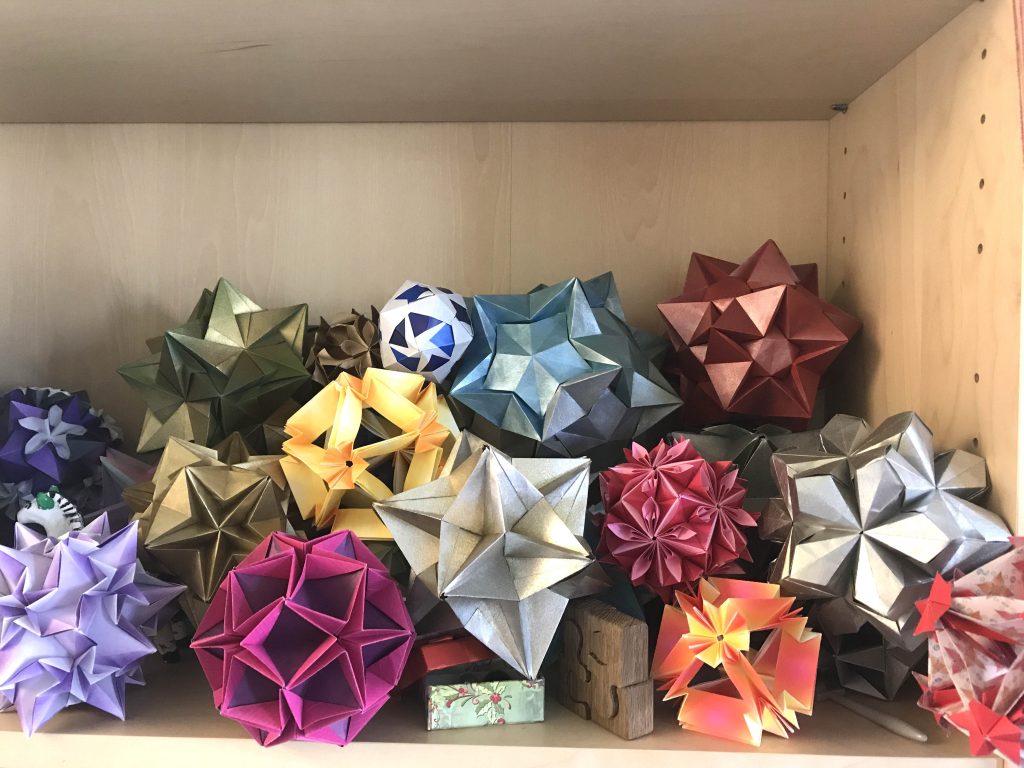Why selling origami is a bad idea
There’s a reason I am writing it. A huge reason. I am seriously thinking about making a T-shirt with ‘don’t tell me how to sell origami please!’ on it.

Every second person that learns about my origami skills tries to discuss how I could sell it. If you think that happened after I’ve become a master you are wrong. This all ‘you need to sell it‘ thing started way before. It started at the time my works didn’t look that cool. It started with my parents actually. Everybody seeing this huge amount of pretty folded stuff in my room would say “Oh, so cute, you need to sell it!”.

The reason I decided to write this is, of course, not my own experience. I get at least 1 email per month asking me how to sell origami or asking for a permission to sell my models or about the tips about selling origami. And I am just a bit tired to answer the same thing over and over again.
Sad truth about selling origami
I am a bad sales person, I know it, it’s not the thing I am good at. I am a lot better in origami than in sales. So let’s imagine this is the main reason for my origami does not sell well. But I need to point it out that I do not know anybody who would make stable money from selling origami. I do not mean the true Masters of origami like Eric Joisel and maybe a couple of other Masters. You could count those people with one hand’s fingers. I mean that average good level folders who fold other’s people’s models don’t sell them regularly. Even if you get some order or somebody buys your origami for a reasonable price, it’s a single sale. It is usually one of a kind thing. And it is not going to be a stable income source. If you do not believe me you can go at etsy and find a lot of origami for sale there. Does it really sell? Not that much… Etsy is a great tool to see what actually sells and at what price. Some people would price their origami $$$ but there won’t be any constant sales (if any at all).
Solution
Solution number one for getting income is … trying to have better education and/or job. I write this because I am usually asked by the people who are students and try to make it an income. It will be much more profitable for your future to invest in education, really.
Besides income there is one more thing to consider about origami, which makes us think about selling it. We all love to fold, some of us do it really well, but capacity of our friends to get paper figures as presents is limited. We have a lot of precious creations, but we have no idea where to use it…
The thing that you may try and that worked for me is to donate your origami to some charity. Oh yes, you don’t get the money. But you can watch people buying your creations for a good money and you can feel that money going for a good thing. I had donated a bunch of my kusudamas to Paper for Water charity (https://www.



As a conclusion I would like to ask the people who are folding for a long time already, did you ever sell your folded models? Could you do a real business? We need to hear from you 😉 maybe you exist 🙂
PS. and UPD:
This post caused a huge discussion at facebook with many different comments
There’s also the article by Robert Lang (who is a full-time origami artist)
28 Replies to “Why selling origami is a bad idea”
Find me living on skid row if I tried to make any money selling origami and I have been folding for over 50 plus years 🙂
Lol, i agree 100%!
It’s hard to sell and make a living, even though I sell what I’ve already done, to the people who offer me yo but It, or gifts shops, but It is just enough to get more paper!
Well, more paper is a pleasant thing. I like to sell some origami stuff (just for a fact of sale) just because I can tell my parents (who still think it’s useless) that it’s worth 😉
I am looking for someone that can fold money I will explain more if we can talk
Many people can fold money. For all such question, please email me at art @ kusudama.me . I usually answer within a week. I don’t check comments here often.
Most of the people I know making money off origami are doing high end sales or teaching it. I’m not sure anyone is making a comfortable living at it.
Effectively , good article.
I make exhibition since i create models : 17 years , and sell since this time but at this time i have a “true job”. Finally i chose a fulfilment life by becoming origami artist pro since 4 years now. At the beginning with workshops , my first envy is to create unique piece and sell them , but a philosophic problem came to me : i sold my “children” . Finaly i found the good way stop selling my children and sell the exhibition and it works . But you explained it well by push on you need to have a quality works pratically sculptural works and the improvment .
Wonderful article – I agree totally. What fun it is to give away origami things – or donate for charity sales! Of course, none of this answers the question of what to do with tens or hundreds or folded models collecting dust on shelves or in cartons 🙂
why can’t you donate those models in cartons?
Well, I don’t sell origami, but, of course, I hear this advise from time to time 😉 And I still thinking about it. Not about making good money, of course, but.. yes, get rid of folded stuff and, may be, cover expenses of my hobby: buy paper, books, visit conventions.. What do you think, is this realistic?
The charity is very good idea! I’ll do it if I find something in the vicinity.
“they really know how to sell origami” – well.. I think it’s because people who buy those balls are not buying, but donating. They pay not for folded things but feeling they make a good thing.
Yes, of course people buy origami to donate. But the thing is I don’t want my creations to be sold for $10 just because they are worth more. And because when people pay more they value it more. For me it was pleasant to see them paying $$$ no matter if I get the money or not…
Buying paper seems doable to me, however conventions are very expensive (if you add up registration fees + hotel + tickets). From writing books it could be done, but not from selling origami, I guess.
Hi Kate,
If I may, I suggest a slight amendment to the title: Why selling origami is a bad idea (for me).” For some folks, it is a very good idea! But it’s certainly not for everyone, both for the reasons you outline, and because going down that path requires that one deal with questions of pricing, making one’s accessible vs making a living, how much or whether you let the market affect what art you do, etc. In other words, you need to deal with a lot of non-origami stuff to be successful at it.
For the past 15 years or so, selling origami has been a big chunk of my livelihood (how big a chunk depending on how broadly one interprets the term “origami”), and it’s been both artistically and intellectually satisfying. But different folks seek different things from their art (and their livelihood), so rather than trying to give a blanket statement of “you should” or “you shouldn’t,” I try to explain the tradeoffs to folks so they can make that decision for themselves.
Oh, and I, too, get lots of emails and suggestions of the form “you should sell X kind of origami” (or “you should fold X”). It happens often enough that I’ve developed a stock reply: I thank them for the suggestion, and say I’ll consider it. Which is true, and it then lets us move on to other topics.
Hi Robert! I am really glad to have you in this discussion 😉 And the opposite (to mine) opinions are more than welcome! That’s exactly what makes a discussion discussion.
In my article I have a passage about Masters of origami 😉 I did not want to mention exact names there, to not harm anyone by including or not including there. You fall there. You not only create your own models, but you also have published a lot of books, articles and you have a Name. I was mainly writing this article in reply to young people who would ask me how to start origami selling business when they fold someone else’s models. The second question which half of them have is about the copyright in this case (the question which R.L. does not face either 😉 For them I would say my ‘should’ as kind of suggestion. If someone’s origami addiction only lasts for a few years it is really risky to only rely on origami. Addictions come, addictions go. At the same time if someone’s origami addiction is strong, he/she won’t be stopped by my article, right? 😉
I’ve been doing origami for the past 24 years, since teaching myself at 5 years old, so finding this article certainly brought back memories. When I was in grade school, I started selling modular balls at an art gallery. It was fun to make them in my free time, ship them off, and get a check in the mail from time to time. Bringing in $50 here and there was a big deal for me as a kid, so I started spending more time creating with intent to sell. I started doing a couple art shows and began to seeing how much went into fees and learned about how poorly I could sell my work. In high school, I got to the point where people were requesting things, but I was still selling myself short in how much time went into each piece. This stress pushed me away from origami some, and I realized that much of the reason I enjoyed making this art was for intrinsic reasons, not external monetary ones. I stopped selling my art entirely and began to enjoy it again. I can agree with your statement about investing in other professions, because in college, I was able to use what I’ve learned through origami and take it in another direction — product design. Nowadays, I use product design work as income and still make origami for fun. I still don’t sell my work, but instead gift them to friends, people who have helped me in some way, or as trade for art other friends make. This helps me remove any stress of putting monetary value to my work and eliminated my dependency on the art that I enjoy doing for fun.
Thank you for your reply!
It’s indeed a huge issue with undercounting your time while doing origami. Especially with complex modulars. And also people won’t count the time they need to photograph, post it somewhere, advertise etc.
I would also like to add one story where I commissioned some modulars. The trick was that the client wanted them made from white plain paper (and the client is always right). So I folded plain printer paper, several complex modulars in a short period of time (deadline). At some point I understood that I completely dislike this plain white paper and I am nearly ready to pay someone else to finish that :D. If it was no deadline or no obligation to fold something very specific I would enjoy the process a lot more. But when you start working it might become work, not hobby, with all the unpleasant ‘features’ of work.
Hi Kate. I agree with Robert when he clarifies that the title of the post should say “for me”.
I have folded origami for 22 years and in 2010 I opened my origami selling business. At first I did not have many sales but over time I was acquiring knowledge to reach my audience. Selling is not something that happens from one day to another, but a process that takes many years of practice.
How much did I sell? Enough to live, since it was my only money entry for 6 years.
Last year I decided to close my sales business, not for lack of demand, but because I wanted to dedicate myself to teaching others how to sell. In addition to the classes that I give and to dedicate time to my collection of own models that little by little grows.
In the first lines of your post you mention that you do not know how to sell. Well, that’s the reason you did not sell. An origami business requires a full time job to actually generate money.
The people I teach them how to sell are women between the ages of 30 and 45, with studies and work. Many of them mothers looking to take a job from home.
As the Japanese proverb says: If no one can do it, it means that I must be the first to do so.
I love your work and your blog.
Hi Cristina,
I am glad to hear it’s possible (not only from Robert, I would never doubt about him). And I certainly know I am a bad sales, and I also know I am far not alone across origami people. This is a separate talent, really, and I do admire people who easily do that 🙂 At the same time if you are a talented sales and you like to sell, origami is not the most profitable place 😉
Of course if I am writing in my blog I write about me and my experience. I hoped it would be understandable. There’s no universal truth anyway to pretend you know it (in almost any field of knowledge except, maybe, pure math). And I hope that people now can read opposite comments and make up their minds.
> An origami business requires a full time job to actually generate money.
Yes I believe that. And does not it become a job then? In terms that you have the same downsides as any other job has. It’s no more just a hobby. You start getting obligations. It’s important to understand that. And speaking of a full time jobs we get to the point that (my) regular full time job is paid incomparable to origami.
Do you have any page about your teaching so that I could forward those home-mothers asking me about selling origami to you? I think you can post it here.
Hi, of course I understand that in your blog write about your personal experiences. I find this thread very interesting, especially because of the discussion that has been built around it and the diversity of opinions.
I am from Argentina and I help Spanish speaking women. Currently my web is in the process of updating (http://cristinabonnet.com), and I help in my facebook group: https://www.facebook.com/groups/emprenderenorigami/
I had an online business selling personalised folded cards (kaleidoscope folding) and instruction kits for same. I found there was little profit or satisfaction in this ….. although some customers were very complimentary. It was very time consuming ordering materials and arranging posting.
I found Kusudama making very useful in my Social Services work running leisure groups for adults with a variety of challenging behaviour and special needs: Everyone could tackle the making of one simple unit….while the more able or staff could handle some assembly…. a valuable team building exercise.
I’ve also run various one-off group sessions in friends homes and for charity.
But the time and prep these is considerable.
I feel Kusudama is always well received as a present …… best use!
Thank You for the article.
I have been folding for many years (I am not a master at it but all my friends think that I am) and I get asked the same question contantly… I fold because I enjoy it and I only fold when I feel like folding, I fold with what ever paper at hand (most of the time with discarded tickets, receipt or old magazines).
I give away all of my origami to people, I work in public transport and sometimes I see parents with children that are stressed (as a parent my self I know that is very stressful) and by giving them a piece of origami they will get distracted and relaxed giving the parents and other people some peace of mind on the journey .
I got into origami as kid when someone taught me the paper crane and that got me started… by giving other kids origami it will trigger their interest in the art of paper folding.
I fold because its a hobby and I enjoy it, and when it becomes a job I don’t think I will enjoy it as much, origami is still one of few refuges I go to when I need to get away from stresses of life the last thing I need is stress to creep into my refuge.
If anyone wants to make money from origami, I advise them to use origami as tool to get a better job and pay, but making money from its very very difficult…
I agree. Commercial projects are way more stressful for me than just folding. Because you usually have requirements, deadlines and responsibility. Which makes it job and less fun.
I’ve been selling Origami at farmers markets in Hawai’i for the past 10 years. I fold traditional models (mostly cranes) while in transit or during my free time. During the weekends as a kid I used to walk around the farmers markets with strings of cranes. Now that I’m older I’ve progressed to my own booth, several variations of products, gallery exposure & wholesale clients. I’m not making a full time living wage off of my origami alone, but it’s certainly a nice side hustle. Currently I’m making anywhere from $50 – $200 a week.
I am glad for you! How much time do you spend for folding what you sell and also for selling that?
Id like to make life of the origami.
Well, that might be a tough life 😉
I’ve had decent success so far selling online and at a local weekly artist market. I do find that my “plain” models don’t sell very well, the bulk of my sales are from modular balls on beaded string (I sold a ton of those last holiday season) and origami cherry blossoms on elaborate wire branches. I find a lot of customers don’t really know what to do with regular origami models, like they see the point of a paper ornament or a paper flower arrangement but not so much a paper sculpture, then it’s too artsy I guess? IDK. I did notice a slight uptick in non hanging modular sales when I started adding stylish pictures of them used as decor.
I make origami boxes, balls, coasters, stars and hearts for my friends and as presents for kids and professionals who treat me. It takes me ages to design something and often longer to fold them. I cannot imagine anyone being willing to pay for both the materials and the time I spent, unless my time is worth a few cents an hour. It has to be something that I do because I like doing it, and something that I give away because it makes someone smile. It has to be enough to be appreciated.
The reason I wrote this article is young people who come to me and ask me how do they start origami career for money. Which is a very uneasy thing 😉